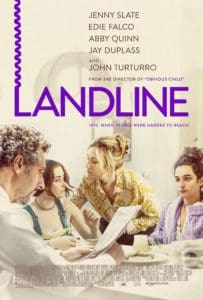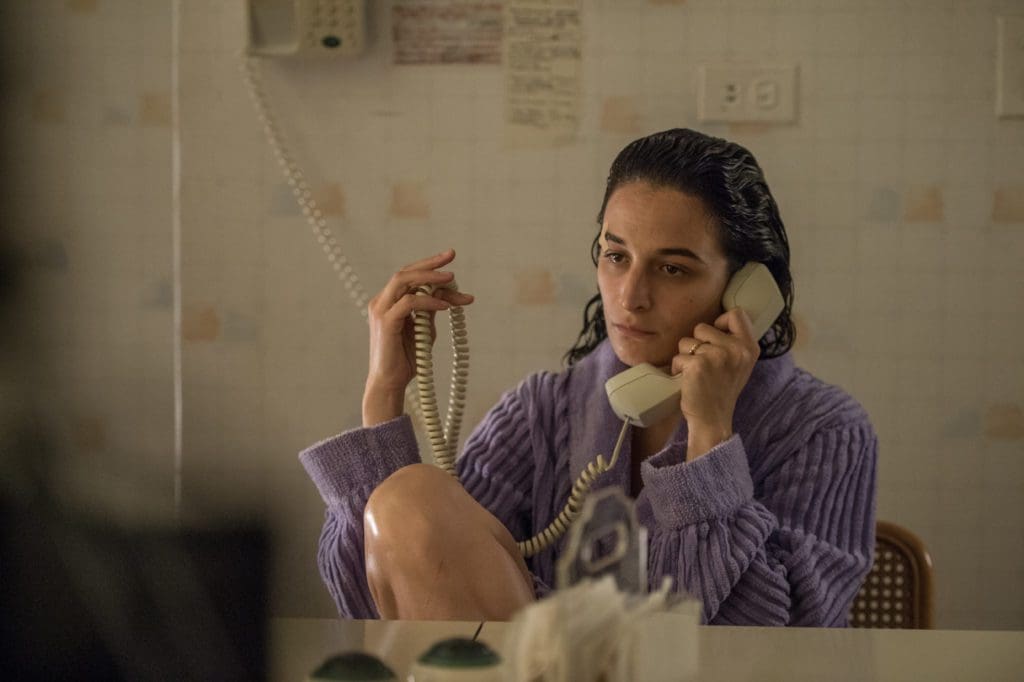
Most people probably know Jay Duplass best as the douche-y Pfefferman brother, Josh, on Amazon’s Emmy-winning comedy, Transparent. However, the actor has actually been pretty busy with other projects lately. Granted, a lot of them are arrogant rich guys, but his character in the upcoming romantic drama Landline is actually a nice guy. We sat down with Duplass to talk about working with Jenny Slate, what it’s like to play unlikable characters and what’s next for him.
How did you become involved with the project? I’m assuming you saw writer/director Gillian Robespierre and Jenny Slate’s previous collaboration, Obvious Child?
Yes, I saw Obvious Child, loved it. Loved Jenny. They said they were interested in me for a part and I read the script and I loved it. Met some of the people [involved], loved them. All the actors were great. I mean, there was literally not a reason not to do the movie. So it was a very, very easy yes.

Your character Ben is sort of a doofus, but he’s a lovable doofus. As an actor, you have to walk a fine line between making the audience understand why Slate’s character might be dissatisfied in their relationship, but also making sure we still understood why they got together in the first place. So, how did you approach that?
Well, I was definitely psyched to play a guy who is nice and – if anything – maybe a little too nice. That was interesting to me. I’ve played a lot of, like, shitty playboys in different variations. Ben was more akin to me personally. I’ve always been that guy who’s a family-friendly boyfriend. I’ll sit bitch — that’s what we used to call it in the South, a totally sexist and shitty term. I’ll sit in between you and your sister in the backseat of your parents car. I’ve also–in my own life–experienced times where I’m like, “Oh my God, I think I might be a little too nice,” or a little too…I don’t know, domesticated, I guess. So I just thought that was really well-observed and really sweet. I loved it and was excited to play it.
You were saying you’ve played a lot of unlikable playboys, are you consciously looking for different characters now or is that not something you think about?
I just want to play interesting people in good movies. That’s a tall order, but that is really all I’m looking for. I’m not super specific about what it needs to be. I think, in retrospect, I had heard when [Robespierre and writer/producer Elisabeth Holm] had first started talking about me for the movie, they were like, “But is he a jerk?” Because I think they had known me mostly from Transparent and there’s definitely some jerky behavior. They were kind of surprised to find out that I’ve been with my wife for 16 years and I have two kids. That was interesting for me to hear because, of course, I know who I am and my friends do. So, I don’t have any agendas, really, but it was kind of cool to break out and do something really close to home and personal to connect to.
Do you think, on some level, that prior experience viewers have with your work might influence the way they approach Ben and actually help make his character arc more effective?
I don’t know. I don’t know how people are thinking about it yet. I don’t know if I’ve even been in enough things to get people thinking that much. I hope to do more. I even enjoy, with Transparent, the fact that Josh rubs people wrong a lot and then all of a sudden, they’ll find themselves crying about something that he’s going through and understanding. In my work, I’m always trying to look for as much complexity as I can mine from the character.
With Ben in particular, he still is a supportive and present boyfriend, but I’ve certainly been in the situation in my life where you kind of just get lazy about how you approach a relationship. I think it’s just a testament to Gill and Lis, who wrote a character who’s probably the fifth most important character in the script and he has his own arc of pulling his shit together and showing up for Dana in a way that she needed him to show up for her. I was just impressed with the script and the characterization in general.

Did you know Jenny Slate beforehand or did you take some time to work on your chemistry before the filming started?
I didn’t know Jenny that well before. We had seen each other around and we had one conversation at the Silver Lake Reservoir [in Los Angeles], just kind of appreciating each other as we walked opposite. I think we had both appreciated each other and I just had a great feeling about her.
What became clear from the minimal conversation we had before the film is that we’re both obsessively students of the human condition. We’re obsessed with people and their strengths and weaknesses and what makes them interesting. So, I guess I never had any doubt that I would feel really comfortable with Jenny doing a lot of the stuff that we have to do—a lot of which is uncomfortable.
Right, you guys have a lot of potentially awkward scenes.
Oh man, we had sex against a tree, we had fight sex, we had a shower together, I peed on her [in the film]. There were a lot of intimate moments in a short period of time, so we just kind of jumped in. I mean, we’re both relationship people, so, I think we both really knew what that was all about and just had to jump in.
The film is set in the mid-’90s, so it’s sort of a period piece. Did it feel like being transported back to that time? Is there even a way to be transported back to the ’90s?
Just even thinking about the ’90s as a period piece is disturbing for a lot of people to realize that it was two decades ago—or more. For me, because I was in college in the ’90s and I was fully conscious of what that used to be like. But being in the moment and not having cell phones and [not] really relying on FaceTime and also just the concept of, you don’t talk to your girlfriend 20 times over text during the day. You might say goodbye to her in the morning and you might not see her until the night or you might not see her for a few days and that’s kind of a normal thing. That feeling did come back in a lot of ways and that was nice to settle into that. I think it’s such a nice, functional element of the narrative. It was nice to have that play out.
Right, Jenny and your characters are the most responsible for giving the movie its name. A lot of your communication is by phone or via answering services.
Yeah, exactly. A lot of payphone, a lot of answering machine messages. Back then, if she didn’t come home for a few nights and you don’t have a cell phone by which to communicate regularly with photos and text, that person feels completely gone from your life. And that is how it used to feel, so yeah, I think our relationship did play out those elements a lot.
What’s next for you? Is the next season of Transparent done filming?
Yes, we’ve filmed the next season of Transparent and it should release around Emmys time, as usual. And then, I’ve been doing a lot of acting and I can’t talk about any of it right now because nothing’s been formally announced. But the other thing that’s happening is, my brother [Mark] and I are releasing our new anthology show on HBO on July 28th, called Room 104.

